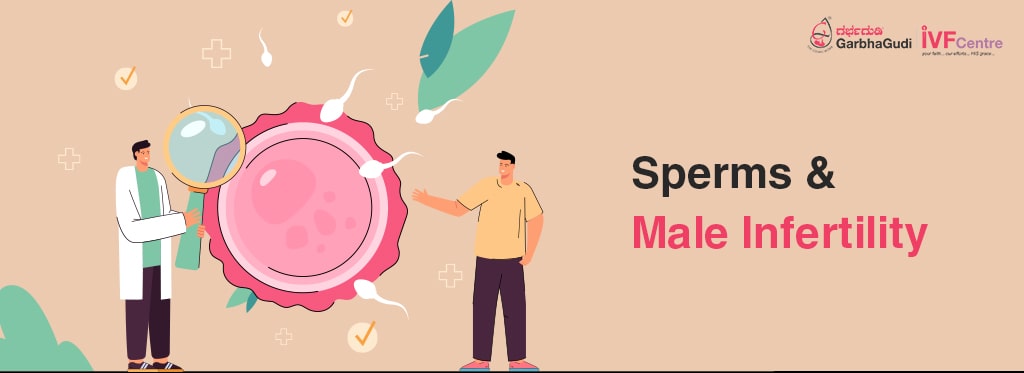Sperms & Male Infertility

Male infertility and the quality of sperms
If you and your partner are struggling to have a baby, you’re not alone. A big per cent of couples in India are facing the challenge of infertility, which is defined as not being able to conceive despite having frequent, unprotected sex for at least a year for most couples. A report by W.H.O stated that 50% of infertility is due to male factors like low sperm count, poor sperm movement, abnormal sperm shape, and poor sperm quality.
Low sperm count
A man’s sperm count is considered lower than normal if he has fewer than 15 million sperm per millilitre of semen which can decrease the chances of conceiving a child simply because it means fewer opportunities for fertilization. Low sperm count is caused by a variety of physiological, environmental and lifestyle factors like infections, hormonal imbalances, and autoimmune problems, emotional stress, depression and obesity.
Poor sperm movement
Sperm motility is the ability of sperm to move efficiently. It is important in fertility because sperm need to move rapidly and directly through the woman’s reproductive tract to reach and fertilize her egg before the sperm cells die. Damage to the testicles, which make and store sperm, could be a reason to low sperm motility. Semen analysis is the most basic and useful test to diagnose poor sperm motility, as well as other fertility problems.
Abnormal sperm shape
Sperm size and shapes are other factors affecting fertility. Normal sperm have an oval head with a long tail. Abnormal sperm have faulty heads or tail anomalies which might affect the ability of the sperm to reach and penetrate an egg. Men with abnormally shaped sperm tend to have more trouble in the conception process and the shape of sperm is typically a factor in whether a couple is advised to pursue IVF.
Sperm quality
Degradation of sperm DNA affects the health of an embryo’s genetic make-up and can contribute to miscarriage. After men turn 40, the quality of their sperm’s genetic material lessens and the new sperm isn’t as good as the sperm they produced when younger. It’s a natural and irreversible effect of ageing, much like how women’s eggs deteriorate after age 35. Declining sperm quality may not impact a man’s ability to ejaculate or successfully fertilize an egg, but it is more likely to make an embryo non-viable.
Why miscarriage happens.
Miscarriage is the body’s way of dealing with a pregnancy that can’t proceed further due to genetic abnormalities. Since miscarriage occurs only in women, it is often assumed, or secretly felt, that when it does, there is something wrong with the mother. Yet, it’s just as likely that male contribution is responsible; when one half of the genetic material is degraded from the start as in the case of men over 40. The result is often an embryo that’s not chromosomally sound enough to develop into a fetus and baby thus, miscarriage happens.
So what are your choices?
According to experts, if that happens, couples are often advised to make better choices about their lifestyle and choose the best fertility treatment for them. For instance, IVF could be the best treatment to try if there’s moderate damage. IVF can allow couples to select a healthy sperm!
Natural conception is a roll of the dice whether you get sperm with high-quality DNA, or not. But with IVF, one is assured of good sperms and eggs coming together to create a healthy baby.
Share this page
About Us
GarbhaGudi is a chain of New-Generation Infertility Treatment Hospitals equipped with state-of- art-infrastructure & cutting-edge IVF Technology to address infertility issues & their emotional & mental effects on couples. We have a team of qualified & experienced doctors; their in-depth knowledge & expertise leaves no stone unturned to solve all your infertility issues. The Supportive & caring staff is always by your side to motivate & guide you throughout the journey. GarbhaGudi IVF, the best fertility treatment hospital in Bangalore, provides emotional support to couples facing infertility issues and sexual problems
Contact Us